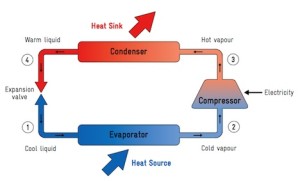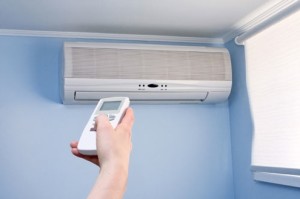Heat pumps are an all-electric heating/cooling alternative to gas powered heating and standard air conditioning. When done right, they can be very efficient. With increasing demand for eco-friendly, efficient homes, heat pumps are now, without a doubt, the future of HVAC technology.
 How they work
How they work
Basically, heat pumps use electricity to transfer heat. They can pull heat from outdoor air and apply it to indoor air, or they can be reversed to cool a building instead. Think of a highly efficient air conditioner run in reverse when in heating mode.
Pros
1. Heat pumps do not require gas. This means no CO2 emissions, and much higher potential efficiency (gas furnaces can never be more efficient than combustion allows, but heat pumps can).
2. Heat pumps consolidate your furnace and AC into one device.
3. Heat pumps produce warm air, not as hot as the air from a furnace. Thus, you get less heat loss when moving the air through a duct system, and more constant, consistent, comfortable air temperature.
4. Electric companies are now providing incentives and rebates for heat pumps. For example, PGE offers a $200 instant discount when installing a high-efficiency heat pump through a PGE-approved contractor. You can also get tax credits, on top of that.
5. Heat pumps are a requirement for a net-zero home.
Despite their advantages, heat pumps have developed a mixed reputation. The “flaws” associated with them, however, are easy to avoid, as you’ll see below.
Cons
1. Switching from a gas system to a heat pump will make your electric bill go up, because heat pumps use electricity. However, electric companies (such as PGE) will account for this. After verifying that you are using a heat pump, they will adjust your rate tiers, giving you more breathing room each month before you hit those higher tiered rates.
2. Heat pumps must occasionally go into defrost mode, during which time they will blow cold air for a few minutes. However, this is barely noticeable if the vents are placed such that they aren’t blowing air directly at anyone. Normally, inefficient electric resistant heat strips are used during these defrost sessions to provide uninterrupted heat. These are very costly to use as they are very high wattage. With proper design and install, these are not needed to stay perfectly comfortable and the system can still operate efficiently.
3. Unfortunately, like any HVAC system, though, heat pumps are often done very wrong! They are particularly dependent on proper calculation, customization, system sizing and installation. The duct system should always be carefully designed along with the install of the heat pump. The ducts and the heating/cooling unit are, after all, one system. Make sure your contractor is one who first tests a home, calculates heating/cooling loads (Manual J calculations) and utilizes engineering software to design the system.
Forced Air vs. Mini-Split Heat Pump Systems
 Ductless mini-split heat pump systems are small individual cassettes on the wall that provide all electric heating and cooling and are tied to one outdoor condenser unit. They are connected by refrigerant lines and have no duct system. These mini-split systems are situationally useful. Although one outside unit can be linked to up to 4 rooms, the mini-split’s system install cost will increase and the efficiency can decrease the further the indoor cassette is away from the outdoor unit. Thus, ideal uses for these are single rooms, small apartments, or separate small buildings (like a guest house) with no space to install a duct system or are so small that any ducted system would be oversized. They have other advantages, like being flexible and easy to install. Also, many have a remote control for convenience.
Ductless mini-split heat pump systems are small individual cassettes on the wall that provide all electric heating and cooling and are tied to one outdoor condenser unit. They are connected by refrigerant lines and have no duct system. These mini-split systems are situationally useful. Although one outside unit can be linked to up to 4 rooms, the mini-split’s system install cost will increase and the efficiency can decrease the further the indoor cassette is away from the outdoor unit. Thus, ideal uses for these are single rooms, small apartments, or separate small buildings (like a guest house) with no space to install a duct system or are so small that any ducted system would be oversized. They have other advantages, like being flexible and easy to install. Also, many have a remote control for convenience.
Forced air systems are generally more applicable, as most homes already have duct systems, have space for a duct system, and/or have more than a few rooms to keep comfortable. Forced air systems are potentially VERY efficient, but this requires that the building’s air sealing, and insulation effectively retaining heat or preventing it’s infiltration in the summer. It also requires that the contractor gets the sizing and other calculations right.
PG&E – Payment changes when you have all electric heat
PG&E (Pacific Gas & Electric) utility company in California will help you out when you switch your home or residence to all electric. Basically, they raise the tier cutoffs so that a home under this all-electric heat rate plan can use more electricity each month before it is pushed into a higher tier and starts to pay more per kilowatt hour (kWh). This is to compensate for the fact that you are adding winter time electric usage where there previously was natural gas usage. After a heat pump is installed, the homeowner calls up PGE and tells them that they are all-electric heat. PGE then comes over and verifies this. After that, they switch the home over to the new plan. This, in combination with a high efficiency heat pump system install, can potentially mean very lucrative savings for homeowners.
[dropshadowbox align=”none” effect=”lifted-both” width=”640px” height=”” background_color=”#ffffff” border_width=”1″ border_color=”#dddddd” ]For more information about heat pumps and all-electric heating, call (925) 363-4498 or e-mail info@epbuilders.com to speak to a technician, or schedule an energy audit.[/dropshadowbox]

This article provides valuable insights into transitioning from a gas system to a heat pump, addressing concerns about potential increases in electric bills and the importance of proper installation for optimal efficiency. It emphasizes the need for careful calculation, customization, and system sizing to ensure effective performance.